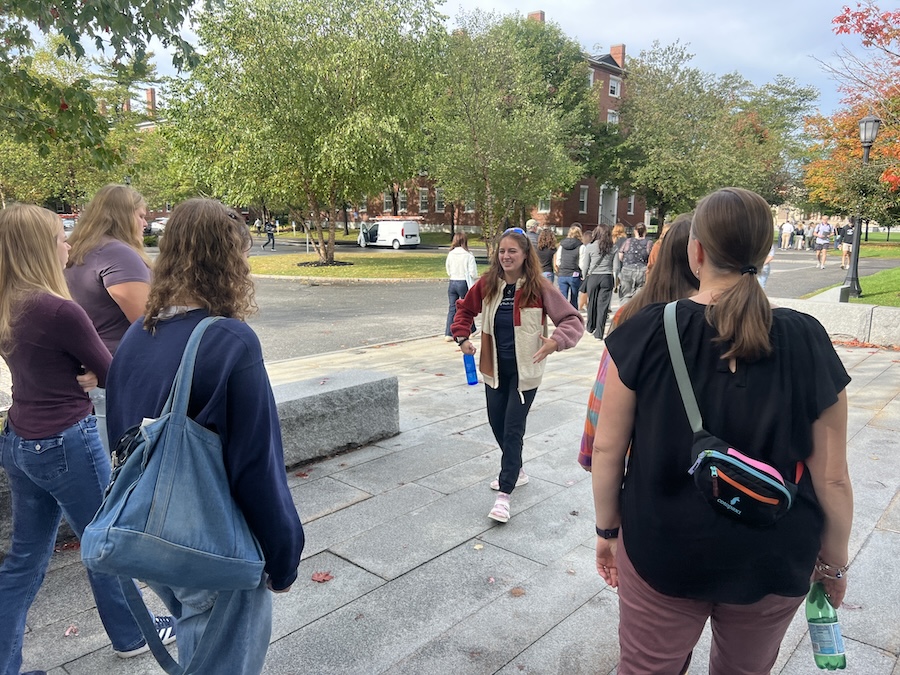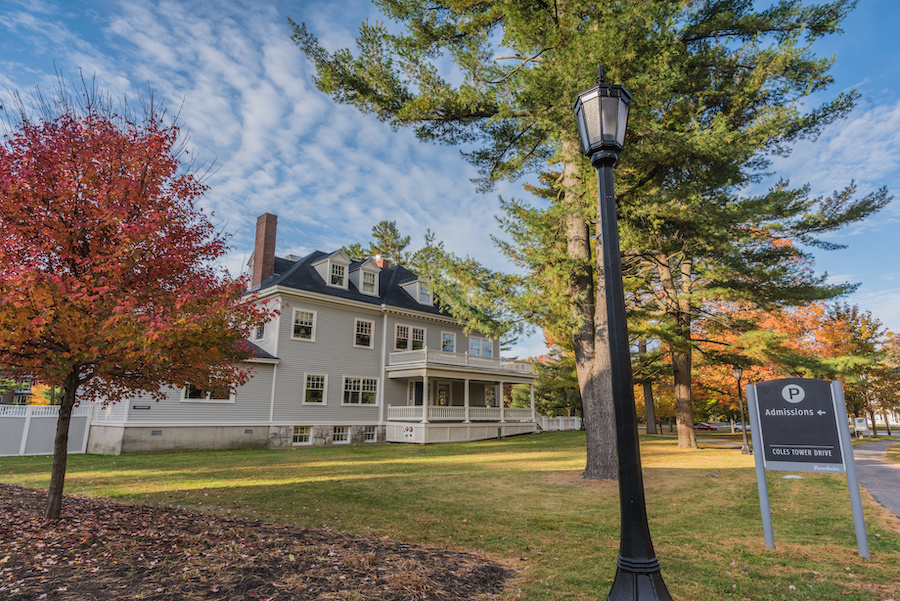Scott Meiklejohn: An Essay on Essays
It’s essay time for college applicants everywhere. Scott Meiklejohn—Bowdoin’s Dean of Admissions and Financial Aid—has some worthwhile advice for students, whether they are working on some finishing touches or just beginning to write.

I looked out my window one day this week as I was finishing a phone call. An out-of-state car pulled into our admissions parking lot, and out popped a mother and son. They stretched, maybe shaking off the drive. They came together at the back of the car, the son pulling on his sport coat. Here for an interview, I thought. His mother brushed her hands a few times over his shoulders, down the sleeves, tugging on the lapels—acts of care and support. Doing a bit of lip-reading from the second floor of Burton-Little, I was pretty sure she said, “Have fun.” Good message. He gave his mom a peck on the cheek and headed toward our front door.
It’s early November, so wonderful scenes like that will be less frequent for a while, as we get closer to our application deadlines. Early Decision I is coming up on November 15, with our regular and ED II deadlines about six weeks later.
For many high school seniors, the visits to campus, interviews, college fairs, and other elements of the deciding and applying process are largely over. Students are focusing on their fall coursework, their applications, and of course, their essays.
Most of what our applicants will submit as part of the application process is now either already done or not theirs to do. Academic records over three-plus years of high school are unchangeable and already baked (hopefully not “completely baked” as Benjamin Braddock said in The Graduate); teacher recommendations are out of their control; guidance counselor comments will not be subject to their review; and all of the interesting artistic, athletic, church, service, employment, and summer activities that we learn about in the application are pretty much in the rearview mirror at this point. Only the essays remain, and they are students’ final and very important opportunities to convey ideas and experiences in ways that help paint a full picture of themselves to us as we read their files.
We particularly enjoy reading essays that seem true and connected to the person we’re meeting in the rest of the application. The best essays stay with us and become models for the entire office, and I know that this application season will bring at least a few that get shared among all of my colleagues.
Advice about college essays often begins with words like honest, authentic, and concise. That simple and excellent guidance notwithstanding, it’s clear that some students feel a ton of pressure to pick a topic or a style of writing that will stand out. We get a lot of very good writing from Bowdoin applicants, so most students handle the assignment well. But some writers get pretty far out on the limb with style, vocabulary, and choice of topic. My most frequent advice to students is: please have the nerve to just be yourself in your essay, and help us get to know you by writing about something that is authentically yours, both in topic and style. All students have opinions, reflections, and stories from their lives. All students have read books that inspired, heard music that moved them, or read something in the paper that made them ask, “Why is the world like that?”. These real-life experiences, observations, and ideas are always the best starting point for essays.
I do a great deal of writing in my work, and sometimes I become aware that the keyboard has been idle for a bit and the words are not exactly flowing onto the page or the screen. Usually that’s a signal that I have drifted away from what I really intended to write. Students who are struggling with their essays and who might have hit that pause, or that moment, may find help by returning to a more authentic idea or story about which they can write without reaching for words and phrases to manufacture a great college essay.
A few specific points of advice to students and parents:
• Have someone else look at your essay, at least once. Good choices include a respected teacher, a counselor, a sibling, a parent, or a friend whose writing you respect. After several drafts, it’s easy to become blind to typos or spelling errors that a fresh set of eyes will easily catch. And, in the age of technology, spell-check is not always your friend. We had an essay last year from a student who wrote about his experiences at “________ Predatory School.” We’re pretty sure it was supposed to be “Preparatory.”
• Parents: You might be the person invited to review an essay, but you are not a co-author. Allow your children to write in their own voices and express ideas that are truly their own. If they’re ready for Bowdoin, they surely can handle the essay assignment with only gentle editing from you.
• Understand that we will learn not only from how you write, but also from your choice of topic. We received an essay two years ago from a young man who described his success at reaching level fifteen of some apocalyptic video game. We learned in detail about his strategies for slaughtering warriors or zombies or space aliens or whatever it was, and the hours he’d spent polishing his craft. There wasn’t anything wrong with the writing, but the lasting impression was of someone who seemed to spend a significant amount of time alone in front of a game screen, and we had to wonder if he would fully engage with the people and opportunities of a fabulous small college.
• Some topics and styles are difficult and probably should be avoided. Video games could be one of them. Sex or bodily functions? No, and no. We don’t want to read about these. Breakups and other drama with current or former loves? Usually not a good idea. Humor can work well, but it’s tricky. What cracks you up might not be so funny to the reader of your application. Haiku? Not recommended. Imaginary friends? See above.
• Remember that we are making decisions that are primarily about intellectual promise. You might be very attached to your collection of wacky-colored socks, and you may feel that they say something vital about your personality. Personality is important. Bowdoin isn’t just admitting GPAs—we admit real people. Your application should absolutely express who you are. But making your point about the socks in a way that gives us a stronger understanding of you as a college student could be a challenge.
• Avoid the “SUGs.” There was a teacher at my high school who wrote “SUG” in the margin when he thought a student had made a Sweeping Unfounded Generalization. For instance, each year we read a lot of essays about community service. Occasionally, the conclusions and life lessons based on a chance encounter with a homeless person in the subway, or a week of service abroad, seem so positive, life-changing, and dramatic as to be out of scale with the time invested or the nature of the experience. Some of the best service essays, on the other hand, have been from students for whom service opportunities generated complex questions or confusion rather than simple answers. Speaking of lessons, we had an essay last year from a girl who wrote that “the lesions from that experience will stay with me for a lifetime.” I’m not making it up (see spell-check, above).
• Finally, be sure that the essay does more than simply recount a story or convey what happened. Many essays fall short of being wonderful because the writer provided only the facts, and not his/her reaction or point of view. We don’t learn about you from knowing what happened. We learn about you from how you reflect on what happened.
Over the next five months, we will read approximately 14,000 essays. We look forward to our reading, and I look forward to reporting on the Class of 2017 as it takes shape between now and May 1.
SM



